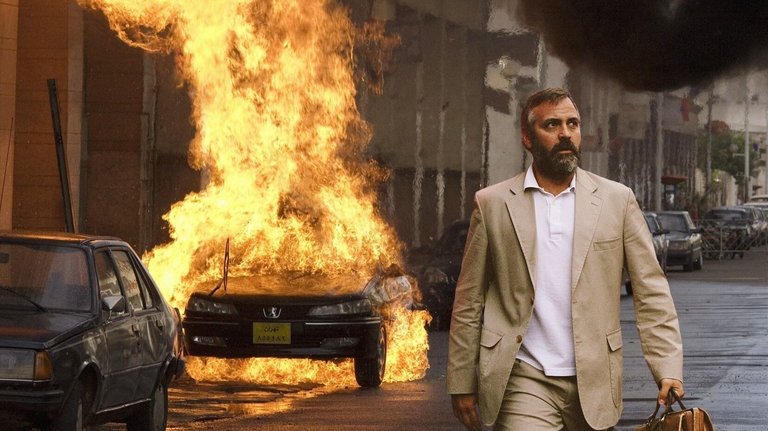Film Review: Syriana (2005)

Hyperpartisan, tribalistic nature of modern Hollywood can be best seen in the different ways it reacts to the very same foreign policy choices depending on the party affiliation of the person in charge. If the right person is in the White House, then wars are enthusiastically supported even if they bring humanity to the brink of nuclear annihilation. If the wrong person is in the White House, not only war, but covert action in pursuit of national interests becomes unfathomably immoral and a source of scandal. An example for the latter was provided during the presidency of George W. Bush and the way Hollywood reacted to his attempts to bring democracy to the Middle East through military force. One such reaction can be found in Syriana, a 2005 political thriller drama written and directed by Stephen Gaghan.
Gaghan conceived his work as an attempt to use the form of a live-action film to elaborate in detail on the theses that made Fahrenheit 911 one of the most popular films in the world one year earlier. The film is based on See No Evil, a 2003 book of memoirs authored by Bob Baer, a former CIA agent who spent two decades working in the Middle East and later earned a reputation as the fiercest critic of George W. Bush and his policies. His fictional alter ego in the film is named Robert Barnes (played by George Clooney) and represents one of the protagonists of the film. The plot is quite complicated and revolves around Nasir (played by Alexander Siddig), a young, idealistic and liberal-minded prince in an unnamed oil-rich Gulf state. His efforts to reform the country led to the termination of a long-standing contract with an American oil corporation and the conclusion of a new contract supplying oil to China. The experienced but disillusioned Barnes is tasked by his Washington superiors to use his connections in the terrorist underworld to solve this problem.
Few Hollywood films have provoked such outbursts of rage among Bush supporters as Syriana did. Gaghan has hit the Neocons where it hurts most with the points put forward in the film. The main goal of US policy in the Middle East is not, as they claim, the spread of democracy, but control over the oil resources there, and for that purpose, tyrannical, conservative and corrupt regimes are far more suitable than some "free agents" who take Western fairytales about democracy and human rights too seriously. Gaghan goes even further and directly points the finger at rich oil corporations as the source of all evil in the world - not only do they have the US government in their pocket, but they are also responsible for international terrorism, because thanks to them, the impoverished masses of the Third World are deprived of any alternative in the struggle for dignity and a better life.
Gaghan presents all these theses through a technique he first used in the acclaimed 1989 mini-series Traffik and its overrated Hollywood remake. The plot consists of seemingly unrelated stories and characters of different origins, occupations and social status who observe one and the same problem from significantly different perspectives. Thus, the symbiotic relationship between American oil tycoons and the government is seen through the eyes of a black lawyer Bennett Holiday (played by Jeffrey Wright) who ensures that the merger of the two corporations goes smoothly, and the bloody consequences of American policy through the fate of a poor Pakistani immigrant Wasim (played by Mazhar Muniz) who embraces Islamic fundamentalism.
Thanks to this, Syriana served as a brilliant, and largely used, opportunity to demonstrate a large number of acting talents. Of all of them, the greatest publicity was given to Clooney's, i.e. a popular actor's decision to compromise his status as the world's most famous screen heartthrob by growing a beard and gaining 15 kilograms of excess weight. For such a great sacrifice, Hollywood rewarded him with his first Oscar in his life.
That was the only Oscar picked by Syriana. However, Gaghan hardly had reason to complain about it. His narrative construction was quite demanding, i.e. someone with far more experience should have stood behind the camera. Gaghan did not exactly excel in that role, to say the least. Syriana is sloppily edited, and many viewers will not succeed in understanding the meaning of certain scenes, i.e. characters and subplots, by the end. Some of them are completely unnecessary, like the economic advisor played by Matt Damon, whose only purpose is to recite what amounts to an abridged version of the monologue from Good Will Hunting.
Towards the end, it becomes clear that Gaghan has sacrificed the realism of his screenplay for the sake of burdening each subplot with "symbolic" father-son relationships. However, the worst of all comes at the end when Gaghan capitulates before Hollywood conventions and concludes the film with a spectacular but banal and utterly unconvincing finale.
Syriana will have the greatest success among viewers who have some prior knowledge of the complicated economic and political problems dealt with in the film, i.e. an already formed attitude that corresponds with the author of the film. But such viewers are relatively few. The rest of the audience - the masses to whom this film sermon was supposed to help understand some important truths about today's world - will spend two hours only to be confused and unable to answer the question of what the author of the film actually tried to say.
RATING: 4/10 (+)
Blog in Croatian https://draxblog.com
Blog in English https://draxreview.wordpress.com/
InLeo blog https://inleo.io/@drax.leo
Hiveonboard: https://hiveonboard.com?ref=drax
Rising Star game: https://www.risingstargame.com?referrer=drax
1Inch: https://1inch.exchange/#/r/0x83823d8CCB74F828148258BB4457642124b1328e
BTC donations: 1EWxiMiP6iiG9rger3NuUSd6HByaxQWafG
ETH donations: 0xB305F144323b99e6f8b1d66f5D7DE78B498C32A7
BCH donations: qpvxw0jax79lhmvlgcldkzpqanf03r9cjv8y6gtmk9